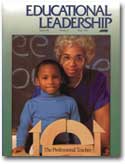Since space restrictions do not allow me to respond in depth to the thoughtful comments of Johnson and Johnson and Sapon-Shevin and Schniedewind, I cannot argue the merits of qualitative vs. quantitative research. However, I believe much can be learned by listening to what students say about the learning situations in which they are placed.
Both responses express concern with the sample and the kind of cooperative learning that went on in the school in question. Using purposive sampling, I selected a school district that illustrated exemplary practices in cooperative learning. The district provided intensive training in the strategy by the Johnsons initially, more training for at least two mentors in each school, at least one inservice per year for approximately nine years, and released time for teachers to observe others using cooperative learning. Although we may decry “limited, simplistic, unimaginative, and poorly structured cooperative learning,” teachers in many schools throughout the country are implementing cooperative learning with less training and support than the teachers in this particular district.
As we explore new ways of teaching, we must closely examine what we and our students are doing. Awarding bonus points and other artificial incentives will not encourage students to achieve if they do not value those incentives. Several of the students I interviewed said that, although they themselves cared about grades and the “quality of the work,” others didn't care at all. One student mentioned a group member who was just “waiting until he was old enough to drop out; he didn't care what kind of grade he got or what kind of grade the group got.”
I agree that we must use cooperative learning arrangements that require students to use “multiple talents and abilities” so that they gain “multidimensional views of one another.” I believe that we can achieve this important goal by using more natural methods of cooperation than artificially structured groups. For example, in writing workshops when students are allowed to write on topics of interest to them and then share their important ideas with others, labels—such as gifted, LD, ADD—usually mean little. Rather than letting the “teacher clarify joint learning goals, divide resources among group members, assign each member a role to fulfill, provide tasks that promote team identity . . .,” why not let the students do these things—as is often done in classrooms for the gifted? We can learn from such programs how to provide students more choices, autonomy, and decision-making power over their own learning.
If I gave the impression, through the comments I chose to include, that the students I interviewed didn't care about their classmates, I am sorry, because they did. All of the students were sensitive and compassionate toward their classmates, but often they didn't understand the differing values of their classmates or how to help them.
In this particular school, most of the students I interviewed were anxious to be accepted into Ivy League and other similarly competitive institutions. How can they value cooperation if their futures depend on excellent grades, restrictive college prep classes, high standardized test scores, and so on? We might want to encourage those at the college level to begin to make the kinds of changes we advocate at the elementary and secondary levels. After all, this is where we really prepare students to take leadership in the world. If we truly value cooperation, we must show our students that it is important at all levels of our society.





